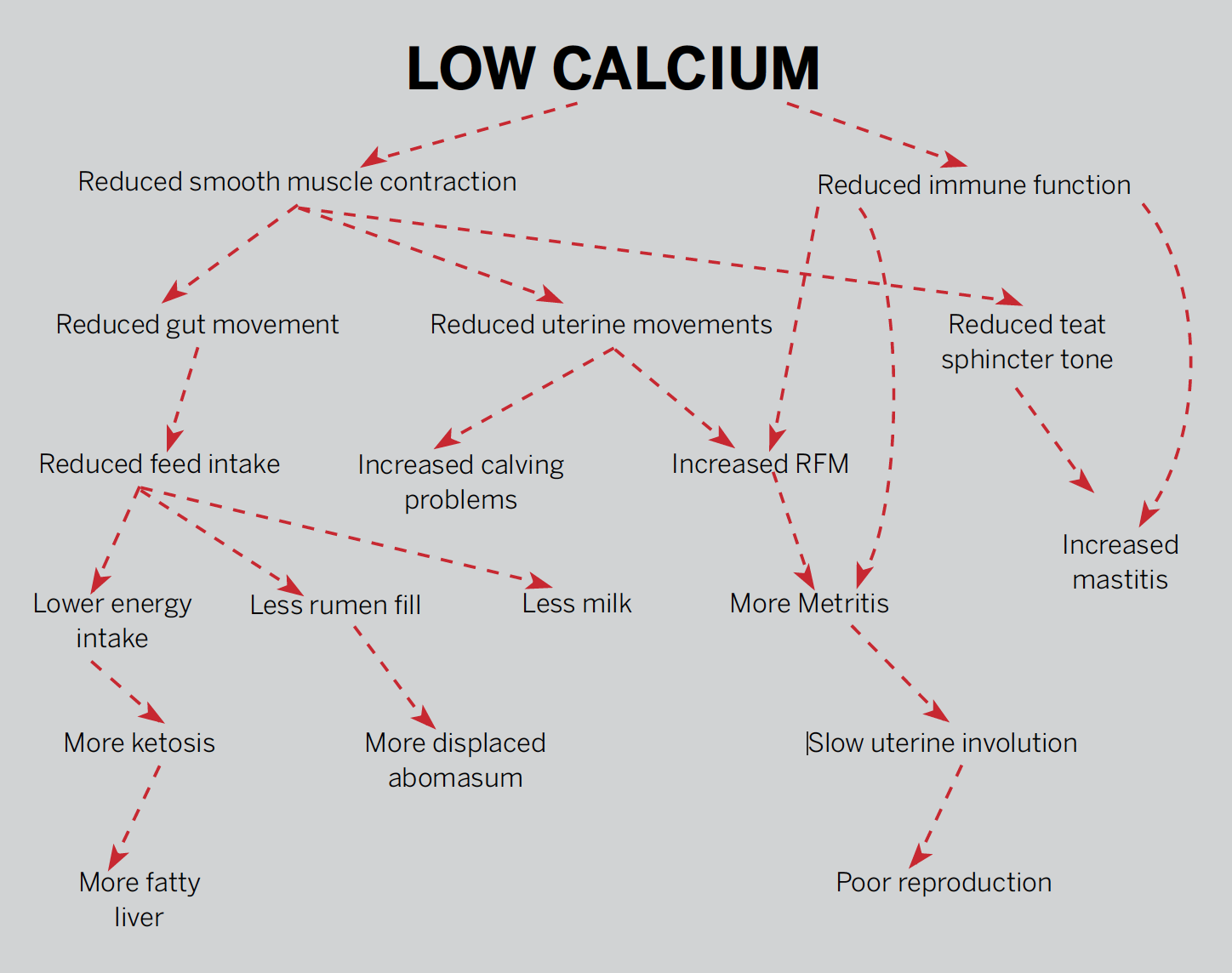Turning data into dollars
If growing more feed at home adds up to $428 profit per tonne of dry matter to your bottom line, wouldn’t it be good to have a ryegrass that gets you there quicker?
Are your cows getting enough calcium?
Last month I attended an informative talk put on by industry suppliers of a new product aimed at reducing milk fever in cows.
What interested me more than the product itself was the fact that there are still large opportunities to make significant improvements to farm performance and animal health in New Zealand herds.
Data presented showed that even in spring calving herds with no obvious signs of Metabolic disease there could be between 30% - 40% of cows suffering from Subclinical Milk Fever (SMF). This figure in cows aged 3 years and above could be as high as 50%.
Cows need calcium for many reasons but the two most important reasons from an animal health perspective are:
Calcium is critical to maintain proper function of white blood cells (cells that fight infection). These cells have lower ability to ‘kill bacteria’ when calcium levels are suboptimal
Calcium is required for muscle contraction. Before a cow ‘goes down’ muscle around the cows’ gut and uterus stops moving
Because of these reasons SMF is associated with a slower calving process, higher calf mortality, more RFM’s, more uterine infection, more mastitis, lower dry matter intakes and ultimately lower milk production as much as 7% with SMF! (see diagram).
 For this reason, SMF is now considered one of the most important ‘gateway diseases’ in dairy production systems, increasing the risk and incidence of many other expensive animal health problems in NZ herds over spring calving, thus making the transition of dry cows to milkers a crucial focus for managers.
For this reason, SMF is now considered one of the most important ‘gateway diseases’ in dairy production systems, increasing the risk and incidence of many other expensive animal health problems in NZ herds over spring calving, thus making the transition of dry cows to milkers a crucial focus for managers.
Applying this to everyday management, we need to start thinking about setting the girls up for the following season now. Recent drought conditions have meant higher levels of supplements are fed late season, many of these supplements (Maize Silage for example) are relatively low in calcium. Without adequate balancing of this mineral in the ration cows will fail to get sufficient calcium to replenish her reserves.
Basic maths: If we take a cow producing 500 Kg MS or 4500 – 5500 litres of milk per season (depending on breed), calcium (0.013% of milk) partitioned to milk equals approximately 8000g per lactation not to mention calcium lost through urine and faeces.
Over a 310 day lactation this would require > 25g of calcium to be replaced daily. Unfortunately, only about 40% of calcium is absorbed from dietary sources so in order to replenish > 25g, a minimum of > 65g needs to be available in her daily intake to meet milk production alone.
This is why it is so important to supply additional calcium supplements in the later stages of lactation especially if reliant on supplements such as Maize Silage.
While I have only referred to calcium in this article, there are many other important minerals and nutrients that can become depleted through daily milk output. Phosphorus being another important mineral emerging as a significant cause of late season down cows in New Zealand herds.
So as we head into winter, we need to be thinking well ahead in terms of ensuring the cows in the herd are being provided with the right nutrients to replenish both body condition and key mineral stores. In some cases, blood samples in late lactation may help identify specific issues. If unsure of your situation seek advice from your veterinarian or nutritional advisor.
• Greg Jarratt is a vet and director of Matamata Veterinary Services
This article is brought to you by J. Swap Stockfoods.
The National Wild Goat Hunting Competition has removed 33,418 wild goats over the past three years.
New Zealand needs a new healthcare model to address rising rates of obesity in rural communities, with the current system leaving many patients unable to access effective treatment or long-term support, warn GPs.
Southland farmers are being urged to put safety first, following a spike in tip offs about risky handling of wind-damaged trees
Third-generation Ashburton dairy farmers TJ and Mark Stewart are no strangers to adapting and evolving.
When American retail giant Cosco came to audit Open Country Dairy’s new butter plant at the Waharoa site and give the green light to supply their American stores, they allowed themselves a week for the exercise.
Fonterra chair Peter McBride says the divestment of Mainland Group is their last significant asset sale and signals the end of structural changes.
President Donald Trump’s decision to impose tariffs on imports into the US is doing good things for global trade, according…
Seen a giant cheese roll rolling along Southland’s roads?